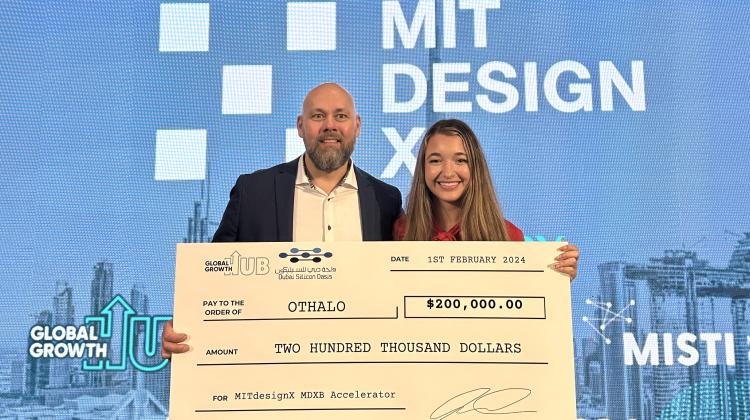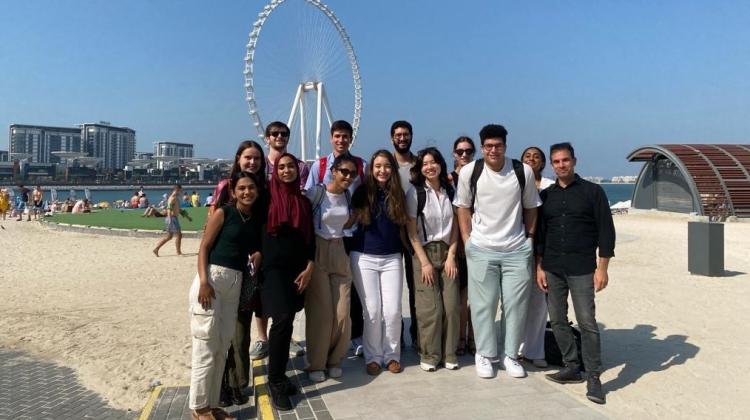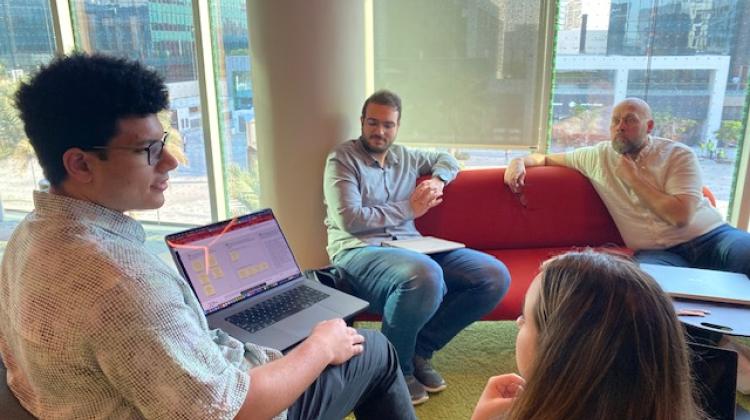MITdesignX and MISTI in Dubai

Frank Cato Lahti (left), CEO and co-founder of Othalo, and Andrea Aude ’24. Othalo won the “investment prize,” given to the most advanced startup in the cohort. Photo courtesy of Andrea Aude.

Twelve MIT students, embedded with the MDXB teams over January’s Independent Activities Period, enjoyed exploring Dubai. At right is Gilad Rosenzweig, MITdesignX executive director. Photo courtesy of Nicolas Stone Perez.

MDXB team members at work.
Photo courtesy of Gilad Rosenzweig.
The Institute’s “mind and hand” ethos has found a home in the United Arab Emirates.
Maria Iacobo | School of Architecture and Planning
MIT has nurtured and celebrated its entrepreneurial culture for decades, with programs and courses supporting innovative startups. MITdesignX — the venture accelerator founded in 2016 in the School of Architecture and Planning (SA+P) and now part of the MIT Morningside Academy for Design — has extended that ethos across the globe.
Over the past four years, SA+P faculty have led venture-building workshops in Reykjavik, Iceland and Venice, Italy, along with academic programs and ideation sessions in Mexico City and Hong Kong. Collaborating with MIT International Science and Technology Initiatives (MISTI) — the Institute’s hub for global education based in the Center for International Studies — MITdesignX recently completed its first program in Dubai.
The MITdesignX Dubai accelerator (MDXB), facilitated by MIT faculty and staff, works with early-stage ventures from across the Middle East and North Africa (MENA) region, offering a framework for these startups to move toward their commercial aims, engage with one another, and gain added value from hosting MIT interns.
It’s a new and exciting frontier for an accelerator that works with startups primarily focused on sustainability. In Dubai, the call for applications to participate specified the topic of “Sustainable Growth of Urban Environments.”
“We unite each of our international cohorts behind themes that are connected and important to SA+P and the world,” says Gilad Rosenzweig, executive director of MITdesignX. “We are aware of the incredible growth of cities, especially in developing nations, and that growth must be done sustainably for the sake of the environment and the people who will live in them. Each team in Dubai had to identify an important problem with the way we build, consume, supply, move, or live in cities, have a feasible solution for it, and propose a viable business opportunity to effectively deploy the solution.” David Dolev, associate director of MISTI and managing director of MISTI’s programs in the MENA region, has been cultivating relationships in Dubai for several years while searching for the right opportunity to involve MITdesignX. For Dolev, key requirements exist for a program to be a good match abroad for the Institute.
“We’re always looking for ways to bring MIT’s ’mind and hand’ methodology around the world to make an impact,” says Dolev. “We also have the capacity to bring people together who might not have this opportunity without MIT’s engagement. Our core mission at MISTI is to offer our students the chance to develop a deeper understanding of countries and cultures so that they can take one step forward on their path to becoming the global leaders that the world deeply needs.”
Taking the program to another level
MDXB received more than 100 applications, from which 12 teams were selected to join the program in November 2023. MIT, with international entrepreneurship development company Global Growth Hub, engaged the Dubai Integrated Economic Zones Authority, a quasi-governmental organization with large development parks across the city, to provide program funding for the workshops and internships, 24-hour workspace, access to labs and industry collaborators, and local support for the teams. MDXB was housed in the Dubai Silicon Oasis Park at the rapidly developing eastern edge of the city.
On campus, MITdesignX works with students, faculty, and research staff at the early-stage development of their ventures over a five-month span that includes two academic courses. Abroad, the program has different scope and cadence, with early-to-mid-stage venture teams required to work full time for three to four months. Rosenzweig, together with MITdesignX faculty director Svafa Gronfeldt, Monique Fuchs, Yscaira Jimenez, and other instructors, conduct two day-long workshops every three to four weeks.
Rosenzweig says that the Dubai cohort was unique in its diversity: in addition to the United Arab Emirates, there were participants from Egypt, India, Jordan, Israel, Palestinian territories, the U.K., and even Norway.
“It was amazing to have this group working together and supporting each other in the midst of another cycle of war and violence in the Middle East,” says Rosenzweig. “Through MISTI and MITdesignX, we’re working beyond and through borders as a collection of entrepreneurs, students, and change-makers to truly build a better world.”
In addition to the MIT-designed curriculum, one MIT student was embedded with each team during January’s Independent Activity Period (IAP). For Dolev, this was a win-win for MIT students and the Dubai cohort.
“These entrepreneurs were very excited to have our students working with them,” he says. “The students brought a concrete tech background and that fresh, cutting-edge student mind.”
Interest from students who applied for the IAP opportunity was overwhelming. Says Dolev, “It’s not a secret that sustainability and climate change are among the most important things the world is dealing with today. It doesn’t matter what our students are studying; they all care about the climate.”
Nicolas Stone Perez, a junior double majoring in computer science/economics/data science and management, was among the 12 students who spent IAP in Dubai. He found Dubai to be “a beautiful blend of cultures.” Stone Perez worked with Fuse AE, a startup that is looking to convert fleets of fuel vehicles to electric. He says he was impressed with the technical background for cars and passion for sustainability exhibited by its co-founders.
“Something I took away was feeling empowered and confident that I can do good work elsewhere in the world with people from different backgrounds and cultures,” says Stone Perez. “That’s something I didn’t expect to gain coming into the program.”
Stone Perez’s prior MISTI experiences have been solo, so the opportunity to encounter a foreign country with other MIT students offered “bonding experiences” he welcomed. On weekends the students explored the city, took part in alumni events, toured the desert on camels, and visited other countries in the region.
An experience that stands out for Stone Perez’s fellow intern, Andrea Aude, was riding bicycles in the desert where an Arabian oryx stepped onto the path. Captivated by their history of near extinction and recent resurgence in the Arabian desert, Aude delighted to see the bright white bovid.
The MIT senior majoring in chemical engineering interned with Othalo, a company that upcycles plastic waste into affordable housing building systems using recycled plastic materials as a feedstock to manufacture modular building systems.
“What pulled me to this opportunity was the chance to work at a startup that specifically has an impact in sustainability and experience the work culture in a different country,” she says.
She found the work environment in Dubai to be much less structured than in the United States.
“In the U.S., it’s very much go, go, go, and very formal,” she says. “In Dubai, we would have work meetings over tea and conversations that were more personal. I really appreciated that. It made me wonder about other cultures and how they manage work environments and what we could incorporate in our work environments here.”
Like Perez, Aude says working for her startup was inspiring and increased her desire to explore entrepreneurial opportunities following graduate study.
“I’m very interested in bringing technology to scale,” says Aude, who will begin doctorate work in chemical engineering at Princeton University this fall. “I think this is how you change the world. You commercialize your technology.”
Up next
Reflecting on the dozen companies in the first MDXB cohort, Rosenzweig says that each made changes to their project or business model and are in a better position to go to market and raise money. Applications for the second cohort will be announced this summer, with an expanded theme to include agritech solutions. Dubai’s growing startup ecosystem, as well as its central location with quick access to Southeast Asia, Africa, and Europe, makes it a prime spot to attract international entrepreneurs.
Dolev also sees MISTI’s first engagement in the UAE as a success.
“The demand for this type of program is only going to grow. Both our MIT students and many global investors want to engage with impact-driven ventures — something that this accelerator is really bringing both to the region and to our MIT community. I hope that this MISTI-designX proof of concept is something that we can replicate across the region and the world.”


